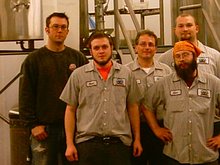Well, Jacob and I survived our trip to the big scary city of Chicago, despite our best efforts to get as lost and intoxicated as possible. We got a late start out of town, since we wanted to see the presentation of our GABF medal to the pub. Jacob actually got the honor of hanging that wonderful chunk of silver on the wall. So after all of that, we drove off into the darkness and the unknown. I must admit that while driving down there I had the feeling that this trip was somehow a combination of Hunter S. Thompson and Stanley Kubrick all wrapped up into one. On one hand I felt the Thompson vibe about to present itself in the way that we were sent to see the festival, but would return home discussing everything but. On the other hand, there was a very real sense of driving straight into the real country darkness to release our mayhem on the unsuspecting world, which gave me a 'Clockwork Orange' kind of feeling. At any rate, we arrived, dropped our beer at the festival site, checked into our hotel, and headed off to the brewer's reception. There we met up with a few good friends of ours - first the Salazaar's from New Belgium and then Frank and Beth from Goose Island. As the party died off, Jake and I decided to venture out to find a dive bar - which proved to be a harder task than either of us had imagined. We wandered the city most of the night, drinking when and wherever we wanted, and eventually headed back to the hotel.
On festival day, we wandered over to Goose Island to meet up with Frank and Beth to have lunch and start drinking some oak-aged beers. We both felt that some beers were better than others (hey, that's the way those things go), and we were both amazed by the New Belgium sour beers. As it turned out, they swept the category taking all three medals. We ended up not winning any medals for our beers - and even though I was disappointed at the time, the beer that I was able to sample more than made up for it.
After the festival (and a few more beers at a few more bars) we headed to the Dogfish Head after party where we met up with a few of our friends who work for some of our supply companies. (Thanks to Kelly and Larry for buying a few rounds and dealing with my drunken nonsense debates about topics that will be spared from this blog). It was shortly after that when Beth entered the scene again and all hell seemed to break loose in our own little group of hooligans. More beer, more random discussions fueled by yours truly, and just when we thought it was safe to get up and leave, it happened. As I tried to squeeze my way past our table to leave, my feet didn't seem to follow and down I went in the middle of the bar - taking some unsuspecting girl out in my path. I don't have to tell you that our time at that bar ended abruptly. We headed back to Frank and Beth's place where more obscure conversations and beers were had - this was another prime example of Kubrick meets Thompson (and maybe a little Kerouac mixed in). I think it is strange enough to meet like minded people around you, but considering that we only get to see these two a handful of times a year, it is amazing the connection that we have made.
So there you have it, the story of two little hillbilly boys (and trust me, there were plenty of times that we felt a bit 'small town' during the trip) trying to navigate the city of Chicago. We made it out alive and had a hell of a lot of fun along the way. Until the next NHBC adventure...
Pierre LeClaire
Monday, November 5, 2007
Subscribe to:
Post Comments (Atom)


2 comments:
Well said.
A common misunderstanding is that by this method a hypothesis can be proven or tested. Generally a hypothesis is used to make predictions that can be tested by observing the outcome of an experiment. If the outcome is inconsistent with the hypothesis, then the hypothesis is rejected. However, if the outcome is consistent with the hypothesis, the experiment is said to support the hypothesis. This careful language is used because research paper recognize that alternative hypotheses may also be consistent with the observations. In this sense, a hypothesis can never be proven, but rather only supported by surviving rounds of scientific testing and, eventually, becoming widely thought of as true (or better, predictive), but this is not the same as it having been proven. A useful hypothesis allows prediction and within the accuracy of observation of the time, the prediction will be verified. As the accuracy of observation improves with time, the hypothesis may no longer provide an accurate prediction. In this case a new hypothesis will arise to challenge the old, and to the extent that the new hypothesis makes more accurate predictions than the old, the new will supplant it.
Post a Comment